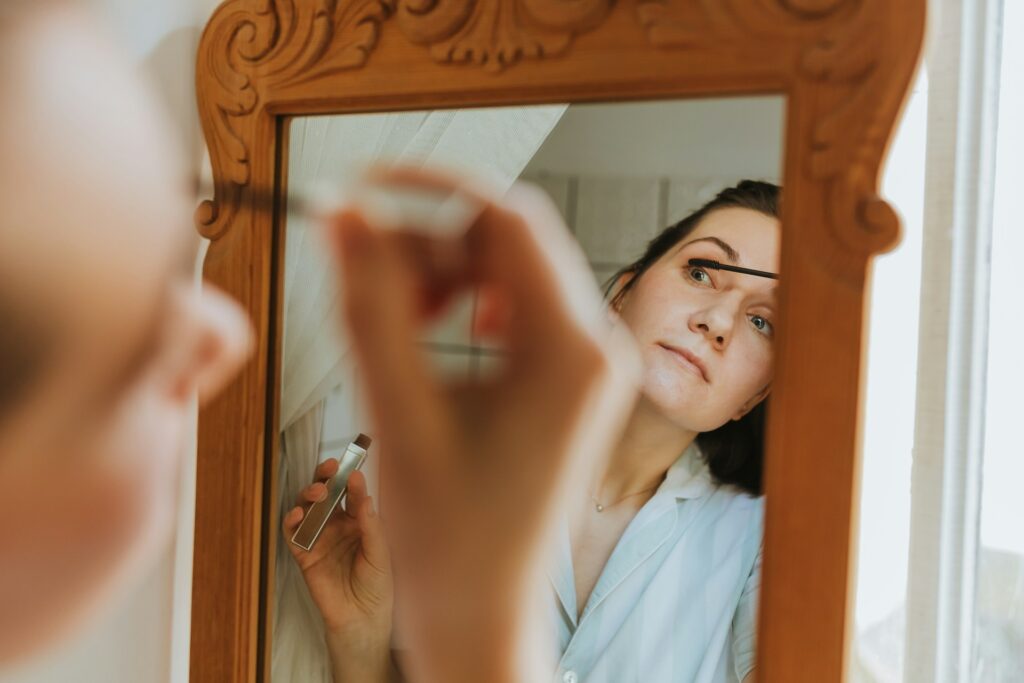You don’t have to be in love with your body every single day to show it appreciation.

Some days, it’s easier to criticise than it is to be kind. But even on the harder days, your body is still carrying you—still breathing, digesting, healing, and holding you together in ways you barely notice. Here are some simple ways to thank your body, even when your self-image is wobbly or your confidence has gone missing.
1. Say thank you out loud, even if it feels weird.

It might feel awkward at first, but literally saying “thank you” to your body can change the tone of how you relate to it. Whether you whisper it after a walk or say it in the mirror, the act itself holds power. You’re not pretending everything’s perfect. You’re just recognising that this body, flawed or not, is still doing its job. And sometimes, that’s more than enough to honour.
2. Stretch for the sake of care, not change.

Instead of punishing workouts or strict routines, do a gentle stretch with no goal other than to release tension. Focus on how it feels, not how it looks or whether it “counts.” It’s a simple way to show your body you’re listening. That you’re not just using it, but supporting it, even in quiet moments.
3. Moisturise like a soft apology.

Turn a regular routine into something a little more intentional. When you rub lotion on dry skin or massage your hands, do it slowly, like you’re saying sorry for all the times you rushed past yourself. It’s not about pampering—it’s about presence. The body hears the difference between care and criticism, even in the small gestures.
4. Stop blaming your body for your bad mood.

It’s easy to take your frustrations out on your body, especially on days when nothing feels right. However, sometimes, your body isn’t the problem. It’s just where the stress or sadness landed. Try to pause before picking apart your appearance and ask what else might really be going on. It’s not about avoiding feelings—it’s about not misplacing the blame.
5. Feed it something nourishing without overthinking it.

Food doesn’t have to be a guilt-ridden choice or a reward system. Giving your body something balanced, satisfying, and comforting is a real-time way of saying, “I care about how you feel.” You don’t need the perfect meal—you just need something that gives your body energy and signals respect. That’s a thank-you in its own right.
6. Let it rest when it’s begging you to.

Rest isn’t lazy. It’s recovery. When your body is screaming for sleep, stillness, or just a break from everything, honouring that is one of the kindest things you can do. You don’t have to earn rest by doing more first. Your body’s needs are valid, even if all you did today was survive.
7. Appreciate what it allows you to do, not just how it looks.

Your body lets you hold people you love, laugh ’til you cry, sing badly in the car, and walk through beautiful places. Even when it hurts or feels unfamiliar, it’s still your access point to the world. Instead of picking apart its shape, try noticing its function. You don’t have to adore every inch of it to acknowledge what it’s made possible.
8. Stop apologising for your body’s existence.

Whether it’s squeezing past someone, covering your stomach, or choosing the “least visible” seat—these small moments send your body the message that it’s inconvenient. You’re allowed to take up space. You’re not a problem to be hidden. Start noticing when you shrink, and challenge the urge to apologise for simply being here.
9. Wear something comfortable, even if it’s not “flattering.”

Some days, the kindest thing you can do is wear clothes that don’t pinch, pull, or make you feel like you’re holding your breath all day. Comfort is a kind of appreciation too. Flattering is often just code for shrinking or reshaping. But confidence doesn’t come from discomfort—it comes from feeling at ease in your own skin, even if no one else notices.
10. Take a photo on a day you feel neutral.

Not when you’re dressed up or perfectly posed—just a moment when you’re being yourself. Documenting your body outside of pressure or performance creates a more honest relationship with how you see yourself. As time goes on, these photos become reminders of resilience and presence, not imperfections. They show that you existed, fully, even on your off days.
11. Talk to it like you would a close friend.

If your best friend said, “I’m tired, I feel gross, I hate how I look,” you wouldn’t shame them. You’d offer kindness, perspective, maybe even a laugh. Try offering your body the same kind of grace. You don’t have to fake positivity. You just have to speak from a place of care instead of critique. That change can soften even the harshest internal monologue.
12. Keep showing up for it, even when it feels hard.

Some days will be easier than others. But the act of still brushing your hair, taking your meds, drinking water—those are quiet thank-yous. You’re not giving up on your body, even if it feels like it’s given up on you. This kind of love isn’t glamorous, but it’s real. And it builds trust between you and the one home you’ll never fully leave—your own body.


